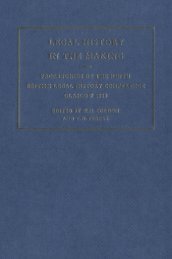130. - Collection Point® | The Total Digital Asset Management System
130. - Collection Point® | The Total Digital Asset Management System
130. - Collection Point® | The Total Digital Asset Management System
Create successful ePaper yourself
Turn your PDF publications into a flip-book with our unique Google optimized e-Paper software.
140 Structure and the Book ofZechariah<br />
8 and he called out to me 1<br />
and he said to me<br />
See<br />
the ]is* pK *?R D'JP have set my Spirit at rest<br />
pax pio<br />
<strong>The</strong>re seems to be some corruption here. Rudolph's solution is probably<br />
the neatest: he keeps rQ "itfR in v. 6, and assumes that the chariot<br />
with red horses, named first in v. 2, together with a singular verb, is<br />
described as going to the east. It is possible to keep the MT 'by<br />
translating v. 3 '...dappled horses; [all] mighty ones'. <strong>The</strong>n v. 7<br />
refers to all the horses as 'mighty ones'. 2 It is tempting to make the<br />
text more regular, but it requires quite a lot of emendation, and there<br />
are irregularities elsewhere in Zechariah. We must reckon with the<br />
possibility that the changes in the pattern are deliberate. 3<br />
Note that probably the most distinctive word in this section is D^nK,<br />
which occurs nowhere else in Zechariah (except that the same root is<br />
found in 12.5). It is further emphasized by its position as the last word<br />
of the first section (vv. 1-3), and as the first word of the third section<br />
(vv. 7-8). This is at least a possible purpose of the word in the text as<br />
we have it, and gives reason to be cautious about emending it. 4<br />
Let us ask about the other irregularities. Why, for example are the<br />
red horses not mentioned again? A possible answer is that they are not<br />
needed (since we can work out where they go from information given<br />
about the others), and their omission puts into greater prominence the<br />
horses who 'go forth to the north' and who bring the chapter to a<br />
in the Hebrew Bible. Perhaps, however, it recalls the opening of the vision where the<br />
focus was initially on the (feminine) chariots. Cf. Meyers, Haggai, Zechariah, p. 327.<br />
1. BDB, p. 277; 'he called me out/forth' would be a more natural grammatical<br />
translation (cf. Judg. 4.10, 13; 2 Sam. 20.4-5) and the Meyers' adopt it (Haggai,<br />
Zechariah, p. 328): 'the prophet is to be fully alert and ready to hear the statement<br />
that follows'. Perhaps; though nothing in previous usage has prepared us for this<br />
understanding. On the other hand, this type of address has not occurred before.<br />
2. Rudolph, Haggai, pp. 122-23. <strong>The</strong> main reason for this is that the first word<br />
of v. 6, "iitfR, indicates that something has dropped out of the text before it. See also<br />
Meyers, Haggai, Zechariah, pp. 316, 320-22; Jeremias, Die Nachtgesichte,<br />
pp. 126-30; W.D. McHardy, '<strong>The</strong> Horses in Zechariah', in In Memoriam P Kahle<br />
(ed. M. Black and G. Fohrer; BZAW, 103; Berlin: Topelmann, 1968), pp. 174-79.<br />
3. Although we must admit here that the case for emendation seems stronger<br />
than for retaining MT.<br />
4. A line may still have been dropped out of the beginning of v. 6.






